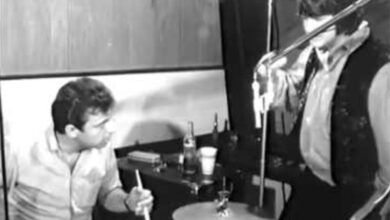Gordon Lightfoot rendered a deeply evocative interpretation of “If You Could Read My Mind.”
“If You Could Read My Mind” stands as one of Gordon Lightfoot’s most iconic and enduring pieces, a testament to his profound songwriting abilities. The song, released in 1970, encapsulates the emotional landscape of love’s complexities, weaving a narrative that delves into the heart of communication breakdowns and unvoiced thoughts in a relationship. Lightfoot’s gentle, yet expressive, delivery invites listeners into a deeply personal space, where introspection and melody converge to tell a story of love, longing, and the inevitable parting of ways.
The composition of “If You Could Read My Mind” is marked by its simplicity and elegance, characteristics that have come to define Lightfoot’s musical style. The acoustic guitar serves as the backbone of the piece, supporting Lightfoot’s vocal nuances and the emotional weight of his lyrics. The song’s structure, with its verse-chorus arrangement, guides the listener through the narrative arc, from the initial realization of love’s fragility to the resigned acceptance of its end.
Lyrically, Lightfoot draws on a rich tapestry of imagery and metaphor, likening the failed romance to a ghostly tale of a haunted castle. This metaphor not only underscores the haunting nature of lost love but also elevates the song to a universal plane, where listeners can find echoes of their own experiences in the spectral halls of Lightfoot’s lyrical castle. The refrain, “If you could read my mind, love, what a tale my thoughts could tell,” serves as a poignant reminder of the chasm that often exists between what is felt and what is expressed.
The song’s impact extends far beyond its initial release, having been covered by numerous artists across various genres, each rendition adding a new layer of interpretation to Lightfoot’s original composition. This adaptability speaks to the song’s universal themes and its capacity to resonate across different musical landscapes and listener experiences.
Gordon Lightfoot, born in November 1938 in Orillia, Ontario, Canada, emerged as a significant figure in the folk and folk-rock music scenes of the 1960s and 1970s. His journey in music began early, with performances in choir and local operettas during his childhood. Lightfoot’s move to Toronto in the late 1950s marked the beginning of his professional career, where he became part of the vibrant folk music community, honing his craft and developing his distinctive voice as a songwriter.
Throughout his career, Lightfoot has been celebrated not only for his melodic talents but also for his ability to capture the Canadian spirit in his music. Songs like “Canadian Railroad Trilogy” and “The Wreck of the Edmund Fitzgerald” reflect his deep connection to his homeland and its stories, earning him a revered place in the tapestry of Canadian cultural icons.
“If You Could Read My Mind” serves as a cornerstone in Lightfoot’s expansive discography, encapsulating the essence of his artistry. The song’s enduring appeal lies in its honest exploration of the human heart, a theme that Lightfoot has revisited throughout his career, making him a beloved figure in the annals of folk music.
In sum, Gordon Lightfoot’s “If You Could Read My Mind” is more than a song; it is a reflective journey through the corridors of love and loss, guided by the gentle strumming of a guitar and the tender timbre of a voice that has touched millions. Lightfoot’s legacy, built on such timeless pieces, continues to inspire and resonate with audiences around the world, cementing his status as a luminary in the world of music.





